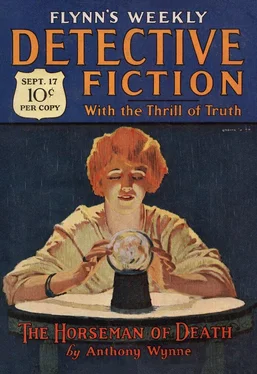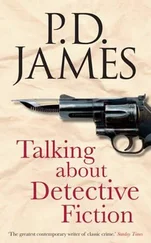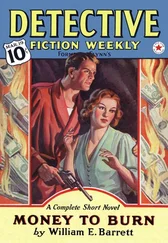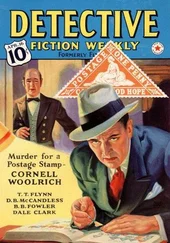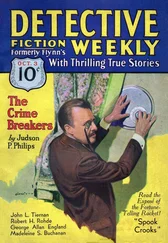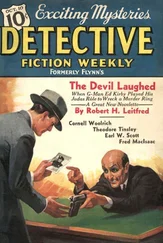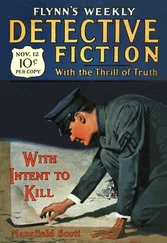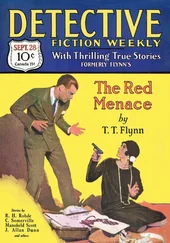Valentine - Flynn’s Weekly Detective Fiction. Vol. 27, No. 1, September 17, 1927
Здесь есть возможность читать онлайн «Valentine - Flynn’s Weekly Detective Fiction. Vol. 27, No. 1, September 17, 1927» весь текст электронной книги совершенно бесплатно (целиком полную версию без сокращений). В некоторых случаях можно слушать аудио, скачать через торрент в формате fb2 и присутствует краткое содержание. Город: New York, Год выпуска: 1927, Издательство: The Red Star News Company, Жанр: Детектив, на английском языке. Описание произведения, (предисловие) а так же отзывы посетителей доступны на портале библиотеки ЛибКат.
- Название:Flynn’s Weekly Detective Fiction. Vol. 27, No. 1, September 17, 1927
- Автор:
- Издательство:The Red Star News Company
- Жанр:
- Год:1927
- Город:New York
- ISBN:нет данных
- Рейтинг книги:5 / 5. Голосов: 1
-
Избранное:Добавить в избранное
- Отзывы:
-
Ваша оценка:
- 100
- 1
- 2
- 3
- 4
- 5
Flynn’s Weekly Detective Fiction. Vol. 27, No. 1, September 17, 1927: краткое содержание, описание и аннотация
Предлагаем к чтению аннотацию, описание, краткое содержание или предисловие (зависит от того, что написал сам автор книги «Flynn’s Weekly Detective Fiction. Vol. 27, No. 1, September 17, 1927»). Если вы не нашли необходимую информацию о книге — напишите в комментариях, мы постараемся отыскать её.
Flynn’s Weekly Detective Fiction. Vol. 27, No. 1, September 17, 1927 — читать онлайн бесплатно полную книгу (весь текст) целиком
Ниже представлен текст книги, разбитый по страницам. Система сохранения места последней прочитанной страницы, позволяет с удобством читать онлайн бесплатно книгу «Flynn’s Weekly Detective Fiction. Vol. 27, No. 1, September 17, 1927», без необходимости каждый раз заново искать на чём Вы остановились. Поставьте закладку, и сможете в любой момент перейти на страницу, на которой закончили чтение.
Интервал:
Закладка:
The detective captain nodded.
“I do,” he agreed. “We have, of course, inquired very thoroughly about his habits and while our findings should be gratifying to you they are not in the least helpful in solving this mystery. His conduct has been exemplary since you left America.”
This appeared to please Mrs. Gulliver and she was just about to speak when the door of Druggan’s office opened. A uniformed attendant entered quietly and spoke softly to the captain.
“What!” Druggan leaped to his feet. “ Send him in here.”
When the attendant withdrew, Druggan turned to his visitor and said quickly.
“This will interest you, Mrs. Gulliver.”
Again the door opened and a huge man stepped through it. Druggan greeted him tersely and presented him to Mrs. Gulliver.
“May I present Detective Thomas?” he introduced. “One of my staff and one of the men who has been working on the death of Mr. Gulliver.”
Thomas bowed.
“This has nothing to do with Gulliver,” he said as he turned to Druggan, “ although in one way it has.”
“Go ahead,” Druggan replied. “Mrs. Gulliver may hear it.”
Thomas proceeded:
“It’s just this, chief,” he said. “Fred Tasney, editorial writer of the Morning Sphere, was found dead in his office this morning, when the cleaners went in to straighten up.”
Druggan knew what was coming.
“He had been stabbed to death,” Thomas resumed, “with a long, slender stiletto.”
“In the heart?” the captain prompted.
“In the heart,” Thomas nodded, “from behind. The knife was stuck in under his left shoulder blade.”
“Any clews?”
The big detective wiped a perspiring forehead.
“Only one,” he returned. “They found a piece of paper on the editor’s desk. It was the same kind of paper we found on Gulliver, and had the same thing written on it.”
Mrs. Gulliver gasped. Druggan was impressed.
“What did it say?” he whispered, as he raised his face to his man.
“Two words, that’s all,” Thomas repeated in that aimless way characteristic of one whose mind is fixed on something else. “All it said was ‘There is.’ ”
The speaker shifted on his feet.
“Hell, chief,” he blurted, “I can’t make it out.”
Druggan shook his head dolefully.
“Neither can I,” he conceded, “but I do know that one thing’s certain. Either we’re dealing with the cleverest criminal we’ve had to handle in my experience or with a raving maniac. Which is it?”
Thomas shrugged his shoulders.
“I don’t know, either,” he said, and he turned to Mrs. Gulliver.
“You see, madam,” he observed, “the police business is not all brass buttons and blue coats. I hope you are convinced that we are trying to do our best.”
Druggan dismissed Thomas, and after a short talk with the widow was convinced that she could do little to enlighten him.
“I wonder,” he mused as he sat at his desk considering this new offense by the “There is” murderer, “whether Barrow’s company had Tasney as a risk.”
Barrow himself answered this question within the quarter hour when he again walked in on Druggan and Conalan.
“Hell,” was the inspector’s greeting, “did you have Tasney, too?”
Barrow nodded.
“We certainly did,” he affirmed, “ but it’s not such a blow this time. Twenty-five thousand.”
Druggan smiled, in spite of the disturbed state of his mind.
“This thing has to be stopped,” he observed dryly, “if for no reason other than to keep the Citadel in business.”
Once again Conalan wondered why Barrow should be so interested in a murder.
“ You pay claims to the beneficiaries of murdered people, don’t you?” he asked.
“We always do,” Barrow agreed, “when there is no collusion on the part of the beneficiary.”
“Do you think there has been in these two cases?”
“I certainly do not think so,” was the reply, “but I’m in the same boat you are in. I don’t know. I’m looking for information.”
Conalan was a trifle pettish.
“Maybe you can give us some,” he sneered.
“Perhaps,” Barrow assented. “I’ve never heard that inspectors of police are infallible. Are they?”
The Citadel’s investigator smiled as he sent this thrust home, and Conalan thawed in spite of himself.
“Don’t mind me, Barrow,” he returned. “I’ve got a lot on my mind.”
Earnestly the three discussed the Tasney slaying. The editor had been one of the most active in the denunciation of the police for failing to find the Gulliver murderer.
He had discussed possible clews, all of them manufactured and having no basis in fact, and had insisted from the beginning that competent investigation would bring the offender to justice.
“There is no such thing as a perfect crime,” he had written. “Detectives who know their business will tell you that no major criminal ever planned one whose commission was faultless.”
Police knew better, of course. How else could the long list of unsolved mysteries be explained? But Tasney, goaded possibly by a fraternal attitude toward a fellow writer, had made his demands. Now he lay lifeless, victim himself of an attack similar to that of which he was so bitterly critical.
“What I can’t understand,” Barrow observed, “is how the killer got Tasney alone in his office. He must have been seen going in.”
Druggan knew the facts. In the interval following Mrs. Gulliver’s visit and Barrow’s appearance he had received them from his men. Briefly they were the following:
It was a habit with Tasney to remain in his office after the others on the staff of the Morning Sphere had left for the night. He had been at work on a book — a political history of the city — and found the quiet of — the early morning hours ideal for writing this.
When last seen by Perry Daniels, a reporter who had been on late duty the preceding night, he was busily engaged at his typewriter — so busy that he failed to respond to Daniels’s “Good night.”
The reporter had switched off all the lights in the city room, so that Tasney’s alone remained lighted on that floor.
Two hours later the cleaners reported for duty and found all the lights out. Tasney’s body was discovered by a charwoman who had entered to straighten up his office. A careful search by detectives had failed to reveal a single clew, and, as with the paper found in Gulliver’s pocket, there was not a finger-print in evidence.
It was maddening to Conalan and Druggan.
“What,” Barrow asked them, “do you make of it, if anything?”
Conalan looked carefully at his questioner.
“Just this,” he said with an emphatic shake of a finger. “This has ceased being a case of an ordinary killer. This one is a bird with a homicidal mania, and unless he is caught, and caught quick, there’s no telling what he’ll do next.”
Chapter IV
“There Is”
When Barrow returned to the Citadel office he found Gresham eagerly awaiting news of this killing. The old chief of claims listened carefully to Barrow’s recital.
“It looks as though we had better pay the Tasney claim without delay, doesn’t it?” he asked when Barrow had finished.
“ Of course,” was the investigator’s ready response. “It seems a tough break that we had to be on both these risks, but it just happened that way. I certainly hope this ‘There Is’ fellow experiences a change of heart.”
Gresham rose from his chair and walked around the desk to Barrow.
“ Charley,” he observed, “ there is just one way a mind of that type can be suppressed. That’s to corner it and put it where it belongs. Unless they do, you’ll find that we haven’t heard the last from this fellow yet.”
Читать дальшеИнтервал:
Закладка:
Похожие книги на «Flynn’s Weekly Detective Fiction. Vol. 27, No. 1, September 17, 1927»
Представляем Вашему вниманию похожие книги на «Flynn’s Weekly Detective Fiction. Vol. 27, No. 1, September 17, 1927» списком для выбора. Мы отобрали схожую по названию и смыслу литературу в надежде предоставить читателям больше вариантов отыскать новые, интересные, ещё непрочитанные произведения.
Обсуждение, отзывы о книге «Flynn’s Weekly Detective Fiction. Vol. 27, No. 1, September 17, 1927» и просто собственные мнения читателей. Оставьте ваши комментарии, напишите, что Вы думаете о произведении, его смысле или главных героях. Укажите что конкретно понравилось, а что нет, и почему Вы так считаете.
